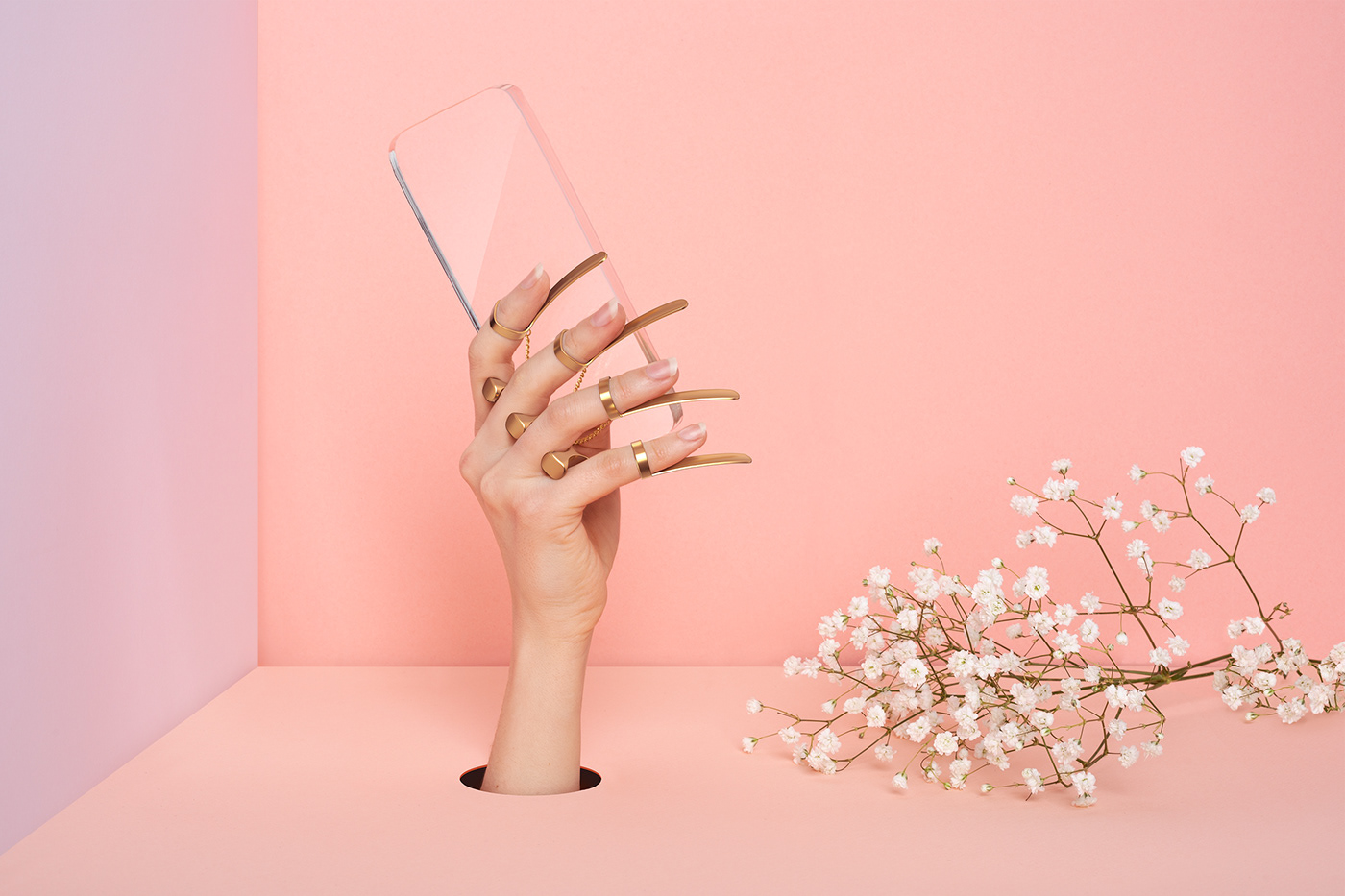
The project’s goal is to explore and draw attention to the problem of gender discriminatory practices in design. Despite increasing awareness of gender equality issues, our society is driven by a male-as-default perspective. Second-generation (unintentional) gender bias is present in many different areas of design and is an effect of multiple causes such as deeply-rooted stereotypes, social constructs, cultural taboos and data gap.
The set consists of four jewellery pieces. Each one was inspired by “masculine” objects transformed into symbols of a resistance against gender-biased society.
photos: Sebastian Mintus / @sebastianmintus
model and styling: Marta Szypulska / @jaszypa
set design: Konrad Dybicki / @dybicki_
The project was greatly inspired by a book "Invisible women. Exposing Data Bias in a World Designed for Men", written by Caroline Criado-Perez. Thank you Caroline.


The hammer necklace tells a story about taste, stereotypes and ”shrink it and pink it” slogan. It’s pink and small, in order to suit a stereotypical woman's taste. It addresses the issue of a "pink tax" – gender-based pricing practice that makes products intended for women about 37% more expensive from comparable products which have only cosmetic differences from products traditionally intended for men.
It’s also a reference to the history of British Suffragettes, who were using miniature toffee hammers to smash the windows of London’s shops in protest during the fight for the right to vote. According to Emmeline Pankhurst - the founder of the Women’s Social and Political Union - “The argument of the broken window pane is the most valuable argument in modern politics”.


Brass knuckles is a reference to one-size-fit-all products that discriminate against women through ergonomics. The problem exists mainly in the areas that were historically dominated by men. Some examples of that are excessively large smartphones (which can cause wrist pain and joint degeneration), protective glasses, gloves and clothing or car seat belts, which design makes women nearly 50% more likely than men to be seriously or fatally injured in a car crash. Despite the fact that women make up almost 15% of USA Army, it wasn't until 2015 when they were granted access to army shoes that would actually fit them – three years after the Army had started implementation of bulletproof vests that would include women's breasts and would not cause body deformations.
The designed object is intended to ironically supplement women’s „shortages” by increasing the fingers’ length by 2 cm – as much as the difference between the average length of a female and a male hand.


The bracelet touches upon a problem of socially imposed gender roles, in particular those related to housekeeping and cleaning. According to studies, women perform over 75% of unpaid work globally. This is mainly due to social and cultural gender-based stereotypes, which continue to associate women with the duty of domestic care. The bracelet was inspired by a table crumber – a tool traditionally used for sweeping tables in high-end restaurants. The jewellery piece is an attribute for playing an expected role and it allows its user to discreetly get rid of unwanted crumbs while eating.


The brooch symbolizes a taboo of menstruation and the phenomenon of treating hygienic products related to the female menstrual cycle as something shameful. Despite the fact that periods are a normal part of everyday life, 48% of girls aged 14-21 in the UK are embarrassed by their periods. The "blue liquid" normally used to illustrate period blood in marketing, only helps to reinforce the taboo.
The designed object is a transparent brooch meant for displaying the femininity. It opens from the top, guaranteeing an easy access to the tampon anytime when neccesary.



























STANDING. A state of design perspective
exhibition / Berlin Design Week
18 – 22 May 2022 / Berlin, DE
DESIGNING EXPERIENCE
exhibition
24 Feb – 12 Mar 2022 / Warsaw, PL
UPCOMING. Selected degree pieces of Academy of Fine Arts in Warsaw
exhibition
10 – 31 Dec 2021 / Warsaw, PL
DESIGNBLOK DIPLOMA SELECTION
contest finalist + exhibition / Designblok 21
6 – 10 Oct 2021 / Prague, CZ
DESIGNING EXPERIENCE
exhibition / Poznan Design Festiwal
10 – 18 Sep 2021 / Poznan, PL
THE LOST GRADUATION SHOW
exhibition / Salone del Mobile. SUPERSALONE
5 – 10 Sep 2021 / Milano, IT
ELLE DECORATION
contest finalist + exhibition / Gdynia Design Days
2 – 11 Jul 2021 / Gdynia, PL







